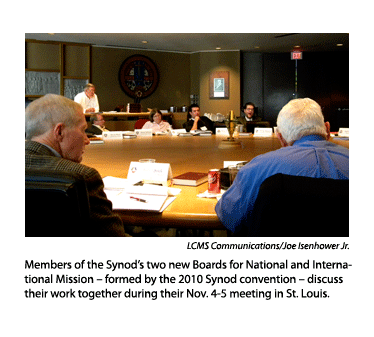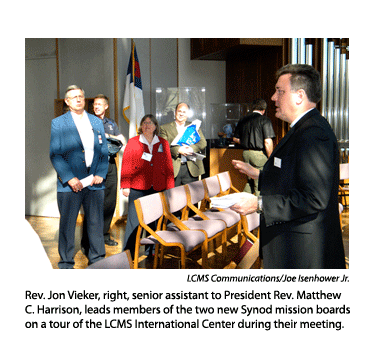By Joe Isenhower Jr.
The Synod’s two new Boards for National and International Mission (BNM and BIM, respectively) are starting their work together by studying and discussing the theological “foundation” that will support and direct the policies they dev
Those two boards began their Nov. 4-5 meeting together with a half-day of presentations and dialogue around what the common theological understandings are that will drive their work and the work of the two new offices.
Members of those boards — formed by the 2010 Synod convention this summer when delegates adopted Resolution 8-08A — indicated their willingness to begin their work by first establishing a common theological understanding for that work. They also noted the value of incorporating the new “Witness, Mercy, Life Together” emphasis of Synod President Rev. Matthew C. Harrison in that common understanding.
Essentially, Res. 8-08A reduces the Synod’s seven program boards and some staffed commissions to the two new policy boards.
The two boards — with 11 members each — first met Sept. 7-9 in St. Louis for orientation and installation of Synod officers, boards and commissions for the 2010-13 triennium. At that time, they also separately elected officers, including Chairmen Rev. Bernhard M. Seter of Grafton, N.D., for the BIM; and Rev. Steven C. Briel, Maple Grove, Minn., for the BNM.
In a resolution adopted Nov. 5 — after a morning of theological study and discussion — the boards jointly asked Seter and Briel to draft proposed theological “bases” and to share them with board members for consideration at their next meeting together (Feb. 4-5 in St. Louis).
That action also conveys the two boards’ agreement that their chairmen will appoint subcommittees for drafting broad policies in the areas of self-governance, oversight and accountability, and board/staff relationships. Later, subcommittees will be appointed to begin drafting macro-policies for “ends” or “aims” for the boards.
As that work progresses, the transition team appointed by Harrison will continue to work with him and with a chief mission officer — when that officer is in place — on developing the Synod offices and functions that will be responsible for implementing the policies developed by the mission boards. Discussion between the two boards regarding division of responsibilities between the two offices will assist and inform the restructuring work of the president’s office.
Also during their November meeting, the two mission boards adopted a resolution asking the Synod president to “carefully consider the actions necessary to properly manage Synod resources” while the boards develop “organization and policies.”
The resolution also states that the boards “respect and support the authority of the president to carry out these necessary actions in accordance with the Synod Bylaws” and that board members “be kept informed” through their chairmen abou
“We are in uncharted territory right now,” Harrison told the boards as their joint meeting got under way.
He recommended that in developing the theological foundation, the boards consider eight theses presented by Dr. Detlev Schulz in his book, Mission from the Cross – The Lutheran Theology of Mission. Schulz is a professor and chairman of Pastoral Ministry and Missions, dean of Graduate Studies, and supervisor of the Ph.D. in Missiology program at Concordia Theological Seminary, Fort Wayne.
“The church is hidden under the cross,” Harrison said, quoting Martin Luther.
He also challenged the boards to develop policies for the church “that will increase capacity” for mission and ministry at all levels, including congregations, districts, the national Synod, and with partner churches.
“We live in a crucial, opportune moment,” Harrison said. “It’s a great moment to be exactly who we are.”
Later in the meeting, Synod Secretary Dr. Raymond Hartwig reviewed with the boards Synod Bylaws pertaining to their developing policy, and Charles Rhodes, the Synod’s executive director of accounting, then provided an overview of finances for the national Synod.
In an Oct. 19 e-mail to mission board members, the two board chairmen gave the rationale for approaching the Synod’s reorganization in a deliberate way.
“Needless to say,” they wrote in their joint message, “the task is monumental … and seems almost impossible when contemplating all the things that Synod ‘does.’ But this work will be done, and as we have said, it is more important to get it right than to get it done right now.”
After the November meeting of the two boards, Seter told Reporter via e-mail that he feels they “reached a new level of comfort and trust and are getting more excited about the important work that they are embarked upon. The level of trust is quite impressive, I believe.”
He also stated that he thinks “the boards have made tremendous progress,” considering that when they met in September, “we looked at each other and wondered what we were supposed to do, how and in what areas. Now … we are well on the way to putting in place the pieces to carry out not only Resolution 8-08A, but some other significant resolutions, as well.”
Seter wrote that he thinks “one of the more important pieces that was accomplished [at the November meeting] was a general consensus or feeling about a theological foundation for what we do and that will lead to better policies and direction. That led to a willingness to work together on a theological foundation, mission vision statement and policies themselves.”
“I want and pray that people understand that there are tremendous challenges ahead for us, especially from the financial end of things,” Seter continued. “There simply are no unrestricted funds. We are, and the President’s Office is, very much aware of the brothers and sisters in Christ [who] are impacted by what we do and the choices we make in these areas. I would hope that congregations and their leaders recognize the significant things we do in our ‘life together’ that need more help and contributions from congregations and their giving to the Synod.”
Also in an e-mail to Reporter, Briel assessed the November meeting as “very profitable.”
He added that there is “a wonderful harmony among the members of these two boards. It was clear that all members present … share a common commitment to the divine nature of the Holy Scriptures, and to the Lutheran Confessions as a true and correct exposition of the Holy Scriptures. All members also share a firm commitment to the mission our Risen Lord has given His church — to spread the Gospel of forgiveness and salvation for Jesus’ sake to a world that is desperate for this good news.
“Because of our common confession,” Briel continued, “we enjoyed frank and open discussion about the future of the LCMS and how best to continue our Risen Lord’s work under the new structure.”
Briel said he considers the boards’ adoption of the two resolutions supporting Harrison and directing the two chairmen to appoint committees “to begin the work of drafting policies for the work of our boards” to be “significant developments.”
He added that “we are making good progress at carrying out the directives given us in Res. 8-08A. We want to ‘get it right,’ so we want to be careful and deliberate in our work.
“Both boards are anxious to serve the congregations of the LCMS,” Briel wrote, “and pray God’s guidance and blessing as we seek to create policies that will benefit God’s people and glorify our gracious God by extending His saving Name and Kingdom throughout the world.”
Posted Nov. 9, 2010

